
Miami’s Seraphic Fire soars with Brahms’ German Requiem
By Sebastián Spreng, Visual Artist and Classical Music Writer
For the Miami ensemble’s second CD, Patrick Dupré Quigley, Seraphic Fire’s founder and artistic director, could have picked a “lighter,” easier work. Instead, he accepted the challenge of Brahms’ Ein Deutsches Requiem. Many will be surprised that this somber masterpiece comes out in late summer, by way of Miami, and constitutes an inspired and totally atypical choice in an equally atypical version. And again, Seraphic Fire proves itself up to the challenge.
Brahms’s Opus 45 is one of the jewels of the choral repertoire. Close to the Lutheran tradition, in his requiem there is no reference to Christ. Inspired the deaths of his mother and Schumann, it was Brahms intended to compose a requiem outside the Latin mold. Leaving the realm of conventional liturgy, he assumed a more universal perspective.
Always a visionary rooted in tradition, Brahms rearranged his score for two pianos, choir and soloists in 1869. Simple, intense and concentrated on the text and song qualities of the original, his transcription is as obsessive at it is immaculate, much more than a simple reduction for pianos. Neither sketch nor outline, it is an accomplished rendering that prompts a peaceful contemplation in its simplicity. In the second, eminently symphonic movement, four notes are enough to achieve a soothing effect and simultaneously express infinite yet serene sadness, elements that define the soul of this most personal requiem and linger in the audience’s mood and memory.
Attentive to the German’s a capella and lieder traditions, Seraphic Fire seeks to evoke the work’s premiere in London in 1871, recreating the intimacy of the parlor of Sir Henry and Lady Thompson, who played the piano for the occasion. That performance was delivered in a now lost English translation known as the “London” Requiem. Between the solemnity of the third movement and the pleasant lyricism of the fourth, Quigley favors elastic tempos in a welcomed dynamic musical language, less severe, brighter and more lyrical than usual.
Both soloists are excellent. Baritone Paul Max Tipton delivers his deep Herr, lehre doch mich with aplomb, and soprano Teresa Wakim sings an ethereal Ihr habt nun Traurigkeit.
Pianists Justin Blackwell and Scott Allen Jarrett provide the backbone and frame of the work as if they were an entire orchestra, which here they actually are. They succeed, as does the brand-new Professional Choral Institute of the University of South Florida, under the direction of James K. Bass.
Something different, and yet curiously familiar, this CD is recommended to longtime fans of the German Requiem and recent initiates alike. Both types of audience will experience another side of a majestic composition in this intimate version of a milestone of the choral repertoire.
It should also be noted that this record bears out yet again the commitment to stimulate and educate audiences, one of the essential virtues of Seraphic Fire and its artistic director.
BRAHMS: EIN DEUTSCHES REQUIEM, SFM 14325 73142
CD available on Amazon: http://www.amazon.com/gp/product/B005I67KRC
Recent Content
-
Artsarticle ·
-
Artsarticle ·
-
Artsarticle ·

